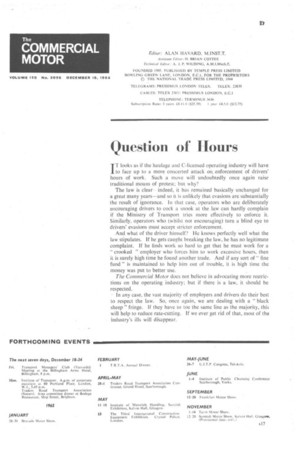Question of Hours
Page 19

If you've noticed an error in this article please click here to report it so we can fix it.
TT looks as if the haulage and C-licensed operating industry will have Ito face up to a more concerted attack on enforcement of drivers' hours of work. Such a move will undoubtedly once again raise traditional moans of protest; but why?
The law is clear—indeed, it has remained basically unchanged for a great many years—and so it is unlikely that evasions are substantially the result of ignorance. In that case, operators who are deliberately encouraging drivers to cock a snook at the law can hardly complain if the Ministry of Transport tries more effectively to enforce it. Similarly, operators who (whilst not encouraging) turn a blind eye to drivers' evasions must accept stricter enforcement.
And what of the driver himself? He knows perfectly well what the law stipulates. If he gets caught breaking the law, he has no legitimate complaint. If he finds work so hard to get that he must work for a " crooked " employer who forces him to work excessive hours, then it is surely high time he found another trade. And if any sort of" fine fund" is maintained to help him out of trouble, it is high time the money was put to better use.
The Commercial Motor does not believe in advocating more restrictions on the operating industry; but if there is a law, it should be respected., In any case, the vast majority of employers and drivers do their best to respect the law. So, once again, we are dealing with a "black sheep" fringe. If they have to toe the same line as the majority, this will help to reduce rate-cutting. If we ever get rid of that, most of the industry's ills will di-sappear.








































































































